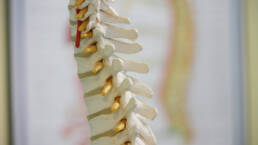The new chemicals scientists have identified in the spine over the years are now in the dozens: from endorphins, adrenaline, serotonin, dopamine, and opiates – these chemicals are called neuropeptides.
Neuropeptides are small proteins that pass information throughout the nervous system.
We use the term “information” very loose here. As it’s not just bits of technical data being passed, but emotions and feelings that are transmitted. The chemicals create a particular recipe that drives your emotions. Fear, anger, sadness, happiness – all of our emotions are influenced by this “neuropeptide soup.”
Mention the word “neuropeptides” and most people would presume that these chemicals live inside the brain.
We’ve come to assume that emotions originate and stay relegated to the brain. However, new evidence is coming to light at a breakneck pace that suggests many of these neuropeptides live inside our spinal cord – and some of which even surround the cells of our body. This throws the theory that emotions are born and thrive only within the brain out of the water. What we’re finding is that when you feel an emotion, this emotion is coursing through your entire body – from head (or brain) to toe!
Your Spine as a Neuropeptide Switchboard
As a chiropractor, what I’m particularly interested in is the spinal cord’s role in all of this. When it comes to neuropeptides, the spinal cord acts as a switchboard for passing the information and emotions throughout the body.
What does this mean in terms of chiropractic?
- Your emotions are tied to the physical health of your spine: Did your back go out, yet you can’t think of anything you did that may have caused the injury? The culprit may not be of physical origin. Emotions may be the cause. Next time you throw your back out, consider your emotional life of late. Perhaps you’re worrying too much, or overstressed at work. Examine your life and think about potential sources of emotional distress, such as bills or relationship issues. There’s a chance that once you find a solution to the problems causing your emotional distress, your back will recover.
- Your spine influences your emotions: In my practice, I’ve seen dozens of patients with a miscellaneous “chronic pain syndrome.” That is, after experiencing a physical injury, their previous “emotional stability” was thrown for a loop. Now depressed and emotionally volatile, they are ping-ponged from doctor to doctor, prescribed various antidepressants, and told that their emotions and pain is “all in their head.” This is of course, bogus. The physical injury has set their “brain reward cascade” into a tailspin. The spinal injury has disrupted the normal emotional ”chemical reactions”. For these patients, their emotional issues will not be resolved until therapy incorporates healing of the spine.
- TRT and emotions: Some of my new patients are surprised at how a spinal adjustment can inspire a transformation in their emotions. Most of the time, the emotions are positive. However, there are certain cases – when years of tension have been locked away in your spine – where a spinal adjustment can “release” old memories and emotions that haven’t been addressed in a long time. In these cases, additional support and psychological therapy may be needed.
To sum this all up: if your spine is tight, then your nerves and emotions are tight. When your spine is out of whack, likely your emotions will be out of whack too. Only once we appreciate the spine’s role in chemicals once thought to live only in the brain, and we take a holistic approach to physical and emotional health, can we get the spine and chemicals in sync and begin to feel better emotionally. Set up an appointment with Apex Chiropractor to check the health of your spine.

Ready to See the Best Chiropractor in Louisville, CO?
Apex Chiropractic believes in thriving through life, not suffering in it. We believe that the activities that we want to partake in do not only desire but are necessary, just as necessary as our daily activities. In order to thrive in life and not suffer, we have to be completely in tune with our bodies. Schedule your appointment with us, today.
Like this article? Spread the word!
Related Posts
April 6, 2023
Torque Release Technique Vs Traditional Chiropractic
Every Chiropractic Dr. has their own go-to method and strategy when relieving pain and…
April 5, 2023
Chiropractic Care Can Fix Your Check Engine Light
Is Your Check Engine Light On? Routine Chiropractic Care Treats the Source NOT the…
April 4, 2023
Why is “The Integrator” the best way to get a chiropractic adjustment?
The Torque Release Technique and the Integrator were recently developed and have allowed…





